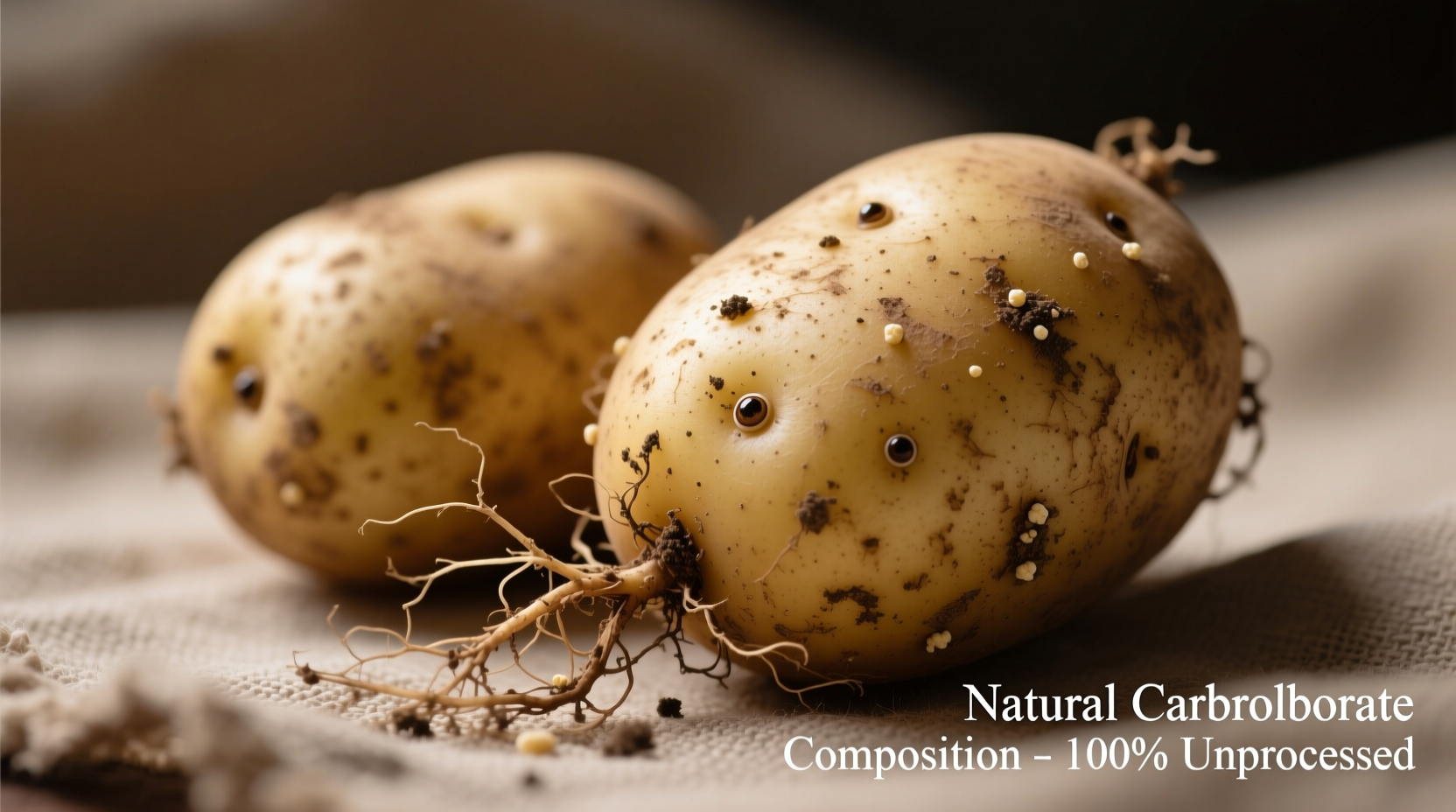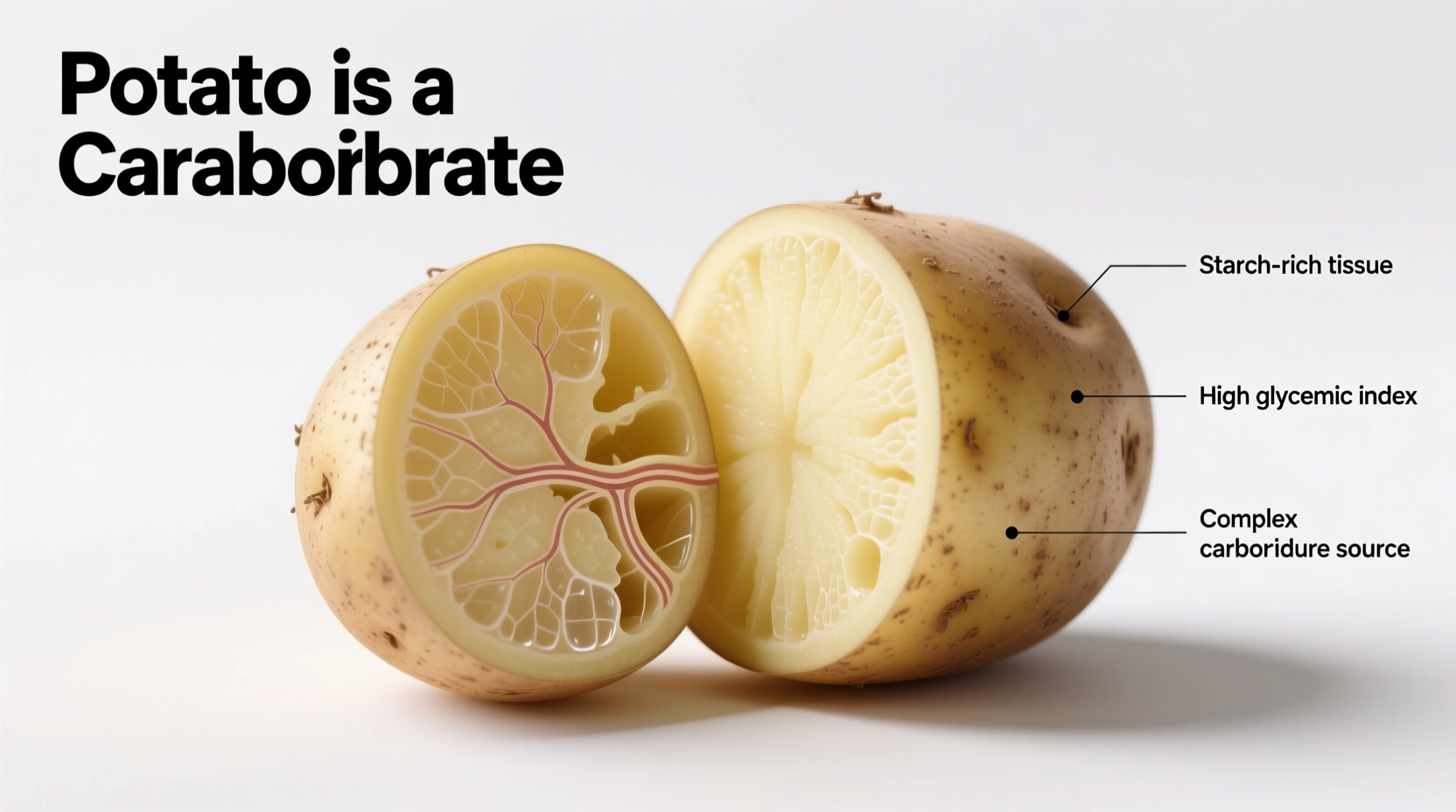When you're trying to understand where potatoes fit in your nutrition plan, knowing their carbohydrate composition is essential. This article breaks down exactly why potatoes qualify as carbohydrates, their nutritional benefits, and how to incorporate them wisely into various eating patterns—whether you're managing blood sugar, building muscle, or simply eating for optimal health.
What Makes Potatoes a Carbohydrate Source
Potatoes fall squarely in the carbohydrate food group because their primary macronutrient is starch—a complex carbohydrate composed of long chains of glucose molecules. Unlike simple carbohydrates found in sugary snacks that cause rapid blood sugar spikes, the starch in potatoes provides gradual energy release, especially when consumed with the skin.
According to the USDA FoodData Central, a medium russet potato (173g) contains:
| Nutrient | Amount | % Daily Value* |
|---|---|---|
| Total Carbohydrates | 37g | 13% |
| Dietary Fiber | 4g | 14% |
| Sugars | 1g | - |
| Protein | 5g | 10% |
| Vitamin C | 28mg | 31% |
*Based on a 2,000-calorie diet. Values may vary by potato variety and preparation method.
Complex vs. Simple Carbohydrates: Where Potatoes Fit
Carbohydrates are categorized as either simple or complex based on their chemical structure:
- Simple carbohydrates (sugars): Found in fruits, milk, and processed foods—digested quickly
- Complex carbohydrates (starches and fiber): Found in whole grains, legumes, and starchy vegetables like potatoes—provide sustained energy
Potatoes contain resistant starch, a type of fiber that resists digestion in the small intestine. This component increases when potatoes are cooked and cooled, making potato salad a surprisingly gut-friendly option. The Harvard T.H. Chan School of Public Health confirms that whole food carbohydrate sources like potatoes deliver essential nutrients alongside their energy content.

How Potato Preparation Affects Carbohydrate Impact
The way you prepare potatoes significantly influences their glycemic response—how quickly they raise blood sugar levels. Understanding these differences helps you make informed choices:
- Boiled with skin: Retains maximum fiber (Glycemic Index: 56-69)
- Baked: Moderate impact (Glycemic Index: 60-70)
- Mashed with butter: Higher impact (Glycemic Index: 70-80)
- Fried: Highest impact due to fat absorption (Glycemic Index: 75-85)
The American Diabetes Association recommends pairing potatoes with protein and healthy fats to moderate blood sugar response. A study published in the Journal of Nutrition found that consuming potatoes with vinegar (as in potato salad) can lower the glycemic response by up to 30%.
White Potatoes vs. Sweet Potatoes: Carbohydrate Comparison
While both are carbohydrate sources, they differ nutritionally:
- White potatoes: Higher in potassium and vitamin C, with a more neutral flavor profile
- Sweet potatoes: Richer in vitamin A (beta-carotene), with a naturally sweeter taste
Contrary to popular belief, white potatoes aren't inherently less healthy. The Academy of Nutrition and Dietetics states that both varieties offer valuable nutrients when prepared healthily. A medium sweet potato contains about 27g of carbohydrates compared to 26g in a white potato—a negligible difference for most dietary planning.
Practical Ways to Include Potatoes in Balanced Eating Patterns
Whether you're following a Mediterranean diet, managing diabetes, or building muscle, potatoes can fit strategically:
For Blood Sugar Management
Choose smaller portions (1/2 cup cooked), keep the skin on, and pair with 3-4 ounces of lean protein and non-starchy vegetables. Cooling cooked potatoes increases resistant starch content, which may improve insulin sensitivity.
For Active Individuals
Potatoes provide ideal post-workout carbohydrates to replenish glycogen stores. Combine a medium potato with grilled chicken and roasted vegetables within 45 minutes after exercise for optimal recovery.
For Weight Management
Research from the American Journal of Clinical Nutrition shows that potatoes can be part of successful weight loss plans when prepared without added fats. Try roasted potato wedges with herbs instead of frying.
Addressing Common Potato Misconceptions
Myth: "Potatoes are empty calories with no nutritional value."
Fact: Potatoes provide potassium (more than bananas), vitamin C, and B vitamins. They're naturally fat-free and contain complete protein when eaten with the skin.
Myth: "People with diabetes should avoid potatoes completely."
Fact: The American Diabetes Association includes potatoes in recommended meal plans when portion-controlled and properly prepared.
Myth: "Sweet potatoes are always healthier than white potatoes."
Fact: Both offer unique nutritional benefits. White potatoes provide more potassium, while sweet potatoes offer more vitamin A. Variety is key for nutrient diversity.
Smart Potato Selection and Storage Tips
Maximize nutritional value by choosing firm potatoes with smooth skin and storing them in a cool, dark place (not the refrigerator). Avoid potatoes with green spots or sprouts, which indicate higher levels of solanine, a natural compound that can cause digestive upset in large quantities.
For best results, cook potatoes with their skin whenever possible—up to 50% of their fiber and many nutrients are concentrated just beneath the skin. When boiling, use minimal water to prevent nutrient leaching, or steam instead.
Conclusion: Potatoes as Valuable Carbohydrate Sources
Potatoes are indeed carbohydrates—complex ones that deliver sustained energy along with valuable nutrients. Their place in healthy eating depends not on eliminating them, but on understanding portion sizes, preparation methods, and how they fit within your overall dietary pattern. By choosing appropriate varieties, cooking methods, and portion sizes, you can enjoy potatoes as part of a balanced, nutritious diet that supports your health goals.











 浙公网安备
33010002000092号
浙公网安备
33010002000092号 浙B2-20120091-4
浙B2-20120091-4